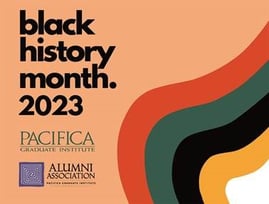
Dear Pacifica Community,
As we continue our celebration of Black History Month, we wish to pay tribute to a few of the many influential, historical black psychologists and educators who made significant contributions to their fields and to advancements in civil rights and social justice.
- Drs. Kenneth B. Clark and Mamie Phipps Clark were a husband-wife team whose landmark research on internalized racism, famously known as the “Doll Study,” was instrumental in the Brown v. Board of Education Supreme Course case that declared segregation in public schools to be unconstitutional. The first African Americans to earn their PhD’s in Psychology from Colombia, they then opened their own agency in 1946, the Northside Center for Child Development, the first full-time center offering psychological and casework services to families in Harlem. Dr. Clark was also the first African American tenured professor at the City College of New York and the first African American president of the APA.
- Dr. Francis Cecil Sumner, known as the “Father of Black Psychology,” was the first African American to earn a Ph.D. in Psychology (1920) and helped in the founding of the psychology department at Howard University, an HBCU. A pioneer in the field of race psychology, notably in themes of variations in mental health and the judicial system, Dr. Sumner also had a significant influence in his advocacy for African-American education.
- If Dr. Sumner is termed the “Father of Black Psychology,” Dr. Joseph White is known as the “Godfather of Black Psychology.” An advocate for the creation of “Black Psychology,” Dr. White worked to expose the explicit whiteness in the field and fought to found the Association of Black Psychologists (ABPsi) in 1968 within the APA.
- Dr. Inez Beverly Prosser was the first Black woman to earn a Ph.D. in Psychology in 1933. While her life was tragically cut short a year later, the legacy of her pioneering endeavor and passion for education live on. Prior to getting her PhD, she spent years teaching, researching, and mentoring young people. Her doctoral dissertation research focused on the study of the psychological effects of segregation on Black students.
- Dr. Robert Williams’ development of the Black Intelligence Test of Cultural Homogeneity, an intelligence test geared towards black speech and experiences, was groundbreaking work to demonstrate the inherent racial bias and unfair discrimination in education and standardized testing. Dr. Williams also helped in the founding of ABPsi, coined the term “Ebonics” referring to African American Vernacular English, and was the first Black psychologist at a hospital in the state of Arkansas.
- Dr. Margaret Lawrence was the United States’ first African America female psychoanalyst, as well as the first Black female physician certified by the Board of Pediatrics. Overcoming childhood tragedies and racist-driven roadblocks throughout her education, she was driven to becoming a healer. Initially drawn to medicine, she began her career as a pediatrician and then pursued child psychiatry She dedicated her life to the underserved and children’s mental health with her therapy focusing on play and artwork. Her pioneering programs and methods in child psychotherapy in schools, day care centers, and clinics are still used today. One organization that Dr. Lawrence was associated with was the Harlem Family Institute, where Pacifica Faculty, Dr. Fanny Brewster, was also connected with several years.
We encourage you to read more on the lives and work of these and many others who worked to advance Black psychology and education. Please also find additional related resources in our Graduate Research Library’s DIVERSITY LIBRARY GUIDE.
Sincerely,
Dr. Lee Dr. Fanny Brewster
President & CEO Core Faculty & Chair of Diversity & Inclusion Council



